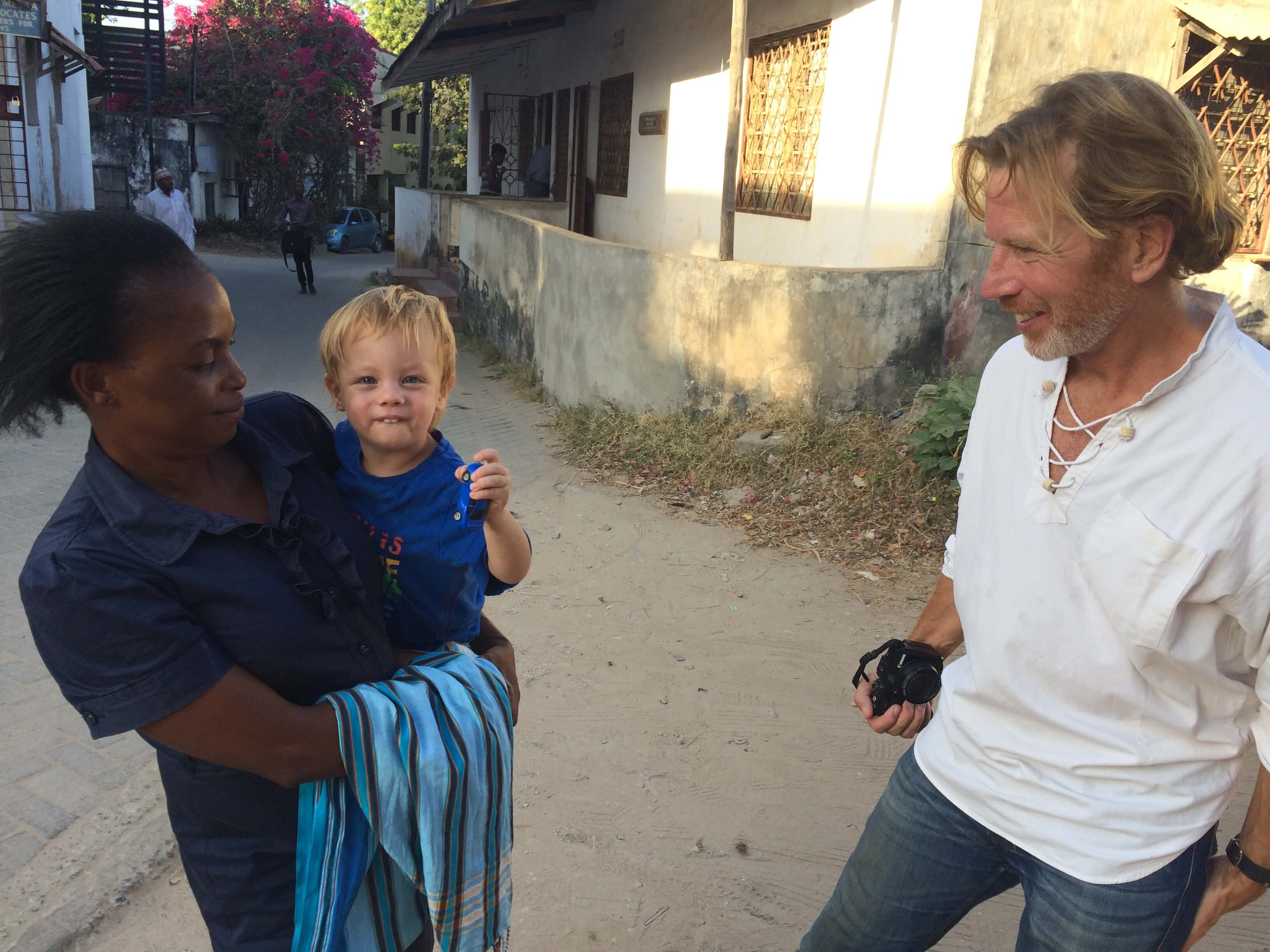
Storytelling is humanity’s primordial gift. From cave paintings in the Pyrenees to the meandering narratives of the latest video games, our depictions of life – in telling and hearing stories told – dictate the way we see the world.
Businesses are increasingly playing the part of storytellers, and documentary film is their preferred format. The visual storytelling of the documentary addresses providence and authenticity, two critical factors in 21st-century marketing. For some, this requires fabrication.
Family businesses, on the other hand, already have ample material; their stories are movie scripts waiting to happen.
Award-winning documentary filmmaker Mark Hopkins and Ramia El Agamy, Editor-in-Chief of Tharawat Magazine and CEO of Orbis Terra Media have teamed up to form a boutique production service to help tell them. We sat down with Mark and Ramia to discuss the various benefits of going through the process of making a film about your family business.
Why is storytelling so important?
Ramia: We make sense of our lives through storytelling. Stories are, without a doubt, one of the most significant aspects of human communication. They show us that we are not alone in our struggles or successes.
Recognising the importance of how we tell stories, Mark Hopkins, the documentary filmmaker, approached me, suggesting that we consider film as a format.
Many of the businesses we interview are shocked to hear how impactful their stories are. So, any chance that we have to share those stories is an opportunity we seize.
Mark: Regardless of the medium, when people tell stories, they are encouraged to articulate the best version of themselves. So, storytelling makes them reflect in ways that they typically do not. The entire process has a remarkable effect on the storyteller.

Ramia, how did you become involved in family business storytelling?
Ramia: I come from a culturally diverse background – half-Dutch and half-Egyptian, but my siblings and I were born and raised in Switzerland. Our story resembles that of many immigrant families. Entrepreneurship is often a survival mechanism, and for us, family business was a way to prove our worth.
Working together came naturally; isolation brought with it a fluent solidarity. Removed from our extended relatives, nuclear family became the highest priority.
Thirty years ago, my father founded a business designing education solutions aimed at businesses in emerging markets around the world. Exposure to the family business model instilled in him a deep respect for their contributions to society, as well as a passion for their success. He came to see them as the backbone of any economy.
Now, his company has also become a family business. Along the way, my two sisters and I joined. I began when I was 11, helping with minor tasks and bookkeeping.
These experiences served as the impetus behind Tharawat Magazine. In 2008, shortly before graduating from business school, he approached me with the idea. Tharawat Magazine began in the library of the business school I was attending. Only a few months later, I graduated, and we launched the magazine pilot.
Now, after ten years and more than 1000 articles, we are one of the most-read family business publications globally.
“…Family business stories speak to the human condition.”
What inspires you about family businesses?
Ramia: I’m still amazed by the way that family business stories speak to the human condition. Our interviews transmit the valuable information that family firms, some centuries-old, carry with them – their culture of innovativeness, their successes and their failures.
Along the way, we have diversified our portfolio under Orbis Terra Media. As a family business ourselves, we are an embodiment of the passion that inspired my father in the first place.

Mark, what inspired you to become a filmmaker?
Mark: Film was not my initial focus. I studied the philosophy of history at Georgetown University and was one of the first students from an American university to have the opportunity to go on an exchange program to Vietnam.
As an outsider, I noticed the explosion of culture all around me. It was miraculous, considering the economic circumstances in Vietnam leading up to the end of the embargo.
I was inspired to capture this cultural shift. I felt privileged to have these experiences and wanted to share that feeling with others. An acquaintance had a camera, so we started rolling. Gradually, after many years of work with major studios along the way, I’ve developed the necessary skills to transmit these experiences through film in a unique way.
Part of my fascination with family business stories comes from the fact that I too come from a business-owning family. Furthermore, over the course of my Hollywood career, countless people have approached me with fascinating anecdotes about their families. The interpersonal relationships that constitute family dynamic make for engaging subject matter business notwithstanding.
So, through this project, my film career, education and family business background intersect. In bringing all of those aspects of my life together, this project is particularly rewarding. It’s always a privilege to help relate someone’s story, even more so if it’s in line with a topic that inspires me.
“Family firms are continually evolving, and archiving is a way to keep track.”
What is the importance of storytelling for family businesses?
Ramia: Stories are a powerful tool for continuity in a family business. It starts with archival work that preserves vital information in a way that oral transmission cannot. Historical archives grant family business members an honest retrospective, which they look to for inspiration.
Family businesses must strike a careful balance between their past, present and future. Disruption demands that businesses must be willing to let go of at least some parts of themselves in the name of sustainability. Family firms are continually evolving, and storytelling is a way to keep track. Without without that , it is easy to overlook events which may at the time seem insignificant. As a society, we have largely ceased journaling. It was far more common in the past for us to keep diaries or logs of daily events.
Nowadays, the closest we come to that level of documentation is social media, which is often distorted by the need to please an audience.
I have a real fear that genuine documentation is disappearing. Family businesses need context, especially when transitioning from one generation to the next.

What makes film the ideal storytelling tool?
Mark: Properly understood, film is the most powerful communicator because of its ability to capture events as they happen, not a facsimile thereof.
Successful family businesses are those that can identify and articulate their core values. They compound that success when the context of those values is archived, especially if it’s in a relatable way. Therefore, film is an incredibly powerful tool to engender family business success now and into the future.
What do you hope to achieve by documenting the stories of family businesses?
Mark: I wish to apply my skills and experience in a direction which has a very tangible output. When I see the visceral emotional response families have as they tell their stories, I’ve achieved my goal.
Family businesses wish to be more involved in the creative process than I initially thought they would be – it brings them together. By the end, when they realise what they have accomplished, it’s an extraordinary moment.
Ramia: Working together on joint projects is invaluable for family cohesion. Formulating your family story is an often overlooked job. It is essential that hard work and triumph is celebrated through story.
We must also consider the therapeutic potential of initiating a family project of this magnitude. It starts a dialogue not only about the past but also about the future of the business. Defining a story means redefining and solidifying values. In this context, film is a potentially unifying force.
Orbis Terra Media initiated this project partly because many family businesses today fail to leverage the fact that they are family-owned. We know that current consumers react positively to family businesses. It is a missed opportunity when those businesses do not capitalise on their providence.
Through film, family businesses can heighten their exposure in the most authentic way, and nowadays, authenticity is a priority when it comes to family business identity.
Mark: Absolutely – modern consumers place origin and origin stories above all else. They engage with compelling family histories; those companies that can leverage their history thrive.
Consumers wish to immerse themselves. Film allows for this level of familiarity.
Ramia: Demand for authentic storytelling across all channels is on the rise. In the information age, non-fiction storytelling has seen a resurgence in popularity.
The frequency and success of documentaries on international streaming platforms like Netflix and Hulu cannot be understated. Other areas that have traditionally performed well, such as the news, are no longer trusted by many viewers. This phenomena has pushed consumers towards other content they feel is more truthful and authentic.
At the very least, I hope this content will entertain. Despite the relevancy of any story, the invaluable messaging therein is meaningless if its audience disengages, which, in an age of media overabundance, they are more likely to do than ever. If we can instil curiosity, inspire reflection and spark discussion, the tell-tale signs of good storytelling, I will be satisfied.
“…A space for honest, thought-provoking and unbiased communication.”
Has the film content you produced in conjunction with family businesses ever surprised you?
Mark: Certainly. Similar themes show up in family business stories again and again, but every narrative is unique. I am always surprised by the unexpected circumstances that come to light.
For example, I was approached by an Italian industrialist that wanted to make a film about his family business’ efforts to go carbon neutral (and here he was achingly honest) not to save the planet, but to impress his daughter.
From the outset, he realised that making an honest film would require substantial efforts beyond his current green initiative, which was only environmental window-dressing. The creative process inspired him to confront the incongruencies in his organisation and actualise his carbon-neutral goals.
Ramia: I cannot overstate how powerful it is when we interview a family business in the process of transformation. A depiction of that process is a testimony of both strength and resiliency, an artefact that can be just as transformative for those that witness it.
There is also power in outlining the failures of a family business. Even if it is only part of a much larger story, a poignant wisdom exists in tragedy.
On that note, both Mark and I strive for authenticity. This project is not merely a platform for corporate videos. Instead, it is space for honest, thought-provoking and unbiased communication.
How do you account for the recent increase in the consumption of film?
Mark: Communication, through modern technology, is easier than ever before. Correspondingly, film, the most powerful format for mass communication, has become more popular than it ever has been – it’s as simple as that.
Ramia: At Orbis Terra Media, our philosophy is: ‘Good content is global content.’ What medium has more reach than film? Film has an unprecedented ability to transcend cultural boundaries, and as globalisation continues, it is only becoming more relevant.
An astonishing amount of content is being uploaded to online platforms and a record number of viewers are viewing this content every day. There is more space than ever for us to tell these stories. If we can create a dialogue which leads to growth and positivity within this space, we will have achieved what we set out to accomplish.
To learn more about the Family Business Films service launched by Mark Hopkins and Orbis Terra Media download more info HERE. Or visit the website HERE.









